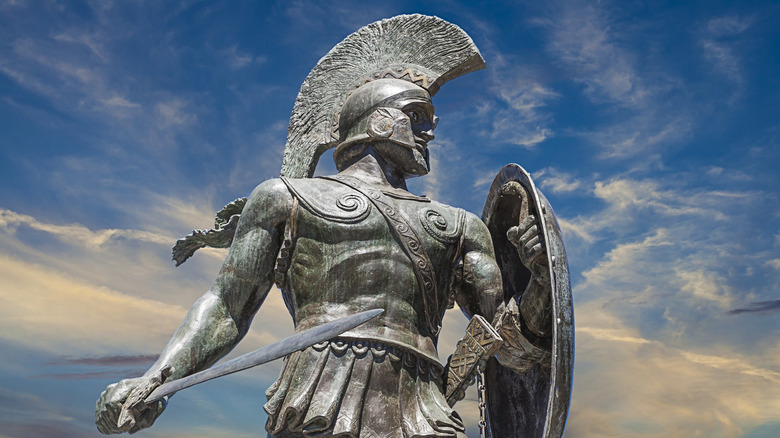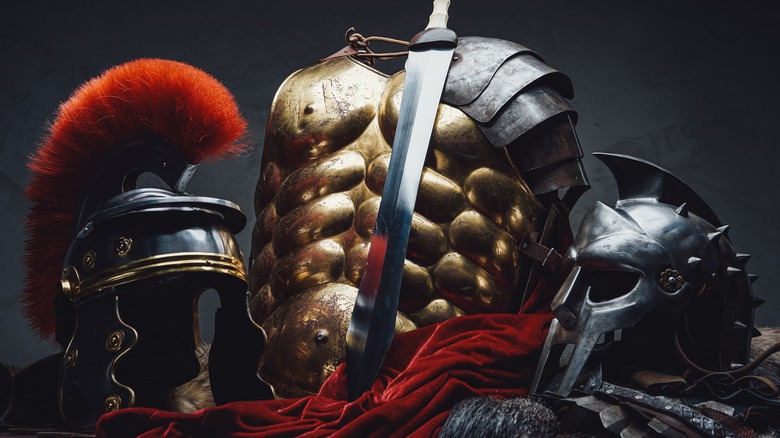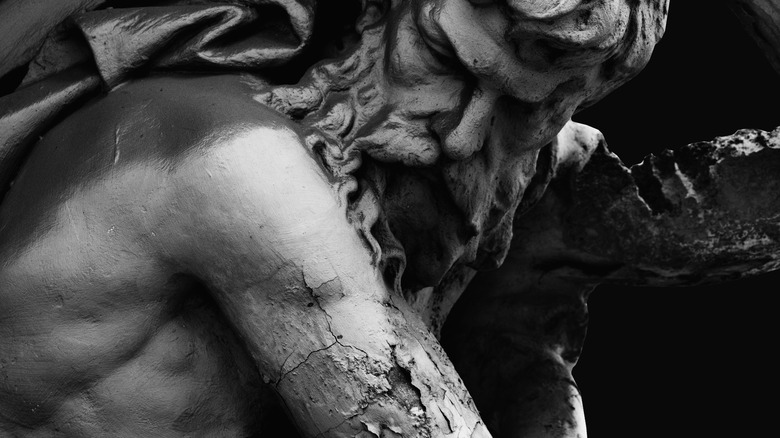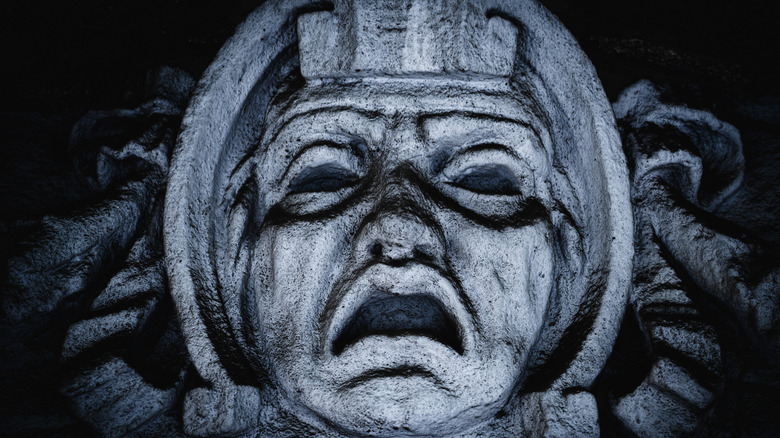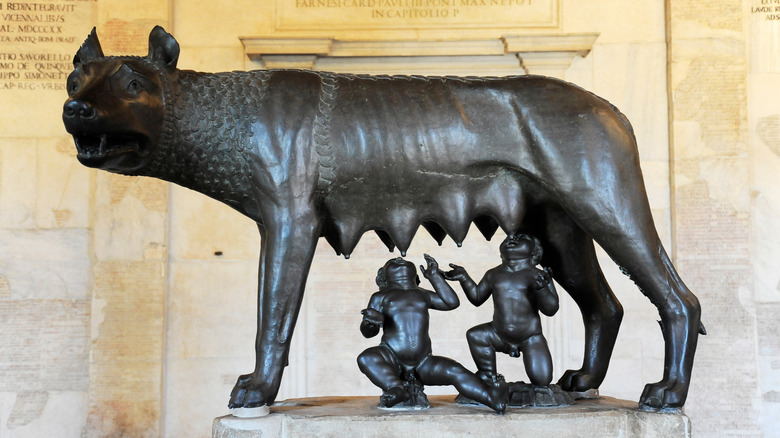Why The God Of War Is Reviled In Greek Mythology But Beloved In Rome
Sometimes Greco-Roman myth can be a bit confusing. Why, for instance, do we lump Greece and Rome together? Why do many — but not all — gods have two names? And why are all the gods so awful and cruel? The answers to these questions shed light on the differences between ancient Greece and Rome.
First off, ancient Greece wasn't anything remotely resembling a unified country. It was a bunch of city-states — Athens and Sparta prominent among them — which lasted in power across the Aegean and Mediterranean Seas from about 700 to 323 B.C.E., per History. Athens represented the region's cultural highwater mark through the fifth century B.C.E., shortly after the Roman Republic was born in 509 B.C.E., per Live Science. Rome rose as Greece dwindled, and the Roman Republic adopted elements of Greek culture as it conquered its way up the Italic peninsula.
Rome didn't have too many of its own native gods, aside from the twin-faced Janus described on The Conversation. So, Rome straight-up copy-pasted Greek myth; hence the "Greco-Roman" moniker. Most of the gods' names got changed to suit the Latin language, like Zeus to Jupiter, except for certain linguistically-friendly names like Apollo. Greece was also an agrarian society where the gods represented the hardships of daily, human life, as The New York Times outlines. But to the hyper-militant Romans, the Greeks were a bit frilly, even effeminate, per "Jesus and Other Men: Ideal Masculinities in the Synoptic Gospels" (posted at Brill). Hence the shift of certain gods in prominence and role, like Ares, aka Mars.
A hateful, necessary, Grecian evil
Let's be clear: ancient Greece was not exactly a docile, antiwar place. Even Athens, wellspring of drama, art, philosophy, and democracy, wasn't full of blubber-faces traipsing about in togas. Athenians drank a lot, argued more, and were constantly at war with their neighbors, as The Atlantic describes. One of those neighbors was Sparta, whose soldiers you might remember from that very ab-laden, loud, 2007 film "300." Sparta's entire society was a state-controlled military monolith where boys were chucked into military service at age 7, required to live in barracks until 30, and stayed a soldier until 60, as History explains. They could do nothing else with their lives.
So how in the world could such cultures, which brutalized, subjugated, and even enslaved their same-language-speaking neighbors, think so poorly of Ares, the god of war? There are complex practical and ideological reasons that boil down to the same old human contradiction we experience nowadays: the tension between moral ideals and practical realities, as Saed News outlines. Just because folks aspire to peace doesn't mean they won't engage in violence which they see as a pragmatic and unavoidable choice. And just because folks engage in conflict doesn't mean they actually crave it.
This is why to the Greeks, as World History Encyclopedia says, Ares was a cruel, hot-tempered, aggressive man-baby. He was physically attractive, and gave heroes like Herakles (Hercules to the Romans) power. And like a necessary evil, he was also "hateful" and the "curse of men."
A lauded, manly, Roman ideal
How about ancient Rome? On the whole, Romans weren't much for philosophizing — they preferred taking action. They lifted their entire religion from Greece and basically said, "Sure, this'll do." Comparing national epics from Greece and Rome — "The Iliad" from Homer and "The Aeneid" from Virgil, respectively — reveals the cultures' differences. The language of "The Aeneid" is grand, muscular, and aggressive. It's everything that Rome wanted to be, especially since Rome's early days were spent under the thumb of their neighbors, the Etruscans, per The Latin Library.
So when Rome finally rose to power and became a republic from 509 B.C.E. to about 27 B.C.E., it turned to warfare and territorial expansion to define itself, per Live Science. Rome marauded its way up the Apennine Peninsula as far as possible, through neighboring tribes like the Samnites, Venetians, and Umbrians, all the way through modern-day Europe and over to England. And after Julius Caesar's great-nephew Octavian became Rome's first emperor, Augustus, Rome kept on conquering anyone in sight. Even though Rome valued orderliness, dutifulness, and pragmatism in a society full of laws, it was birthed in, reared in, and flourished in, bloodshed.
So then, should we be surprised that in ancient Rome, Mars (Ares) took second only to Jupiter (Zeus) himself? Mars was the virtuous embodiment of manliness who presided over not only war, but sports, as World History Encyclopedia says. He didn't even marry until tricked into it by "feminine guile."
The personification of strife
At this point we should clarify the roles that the gods played in the lives of ancient Greeks and Romans. Greco-Roman deities were essences of natural forces. They were powerful beings, kind of like comic book superheroes, but that's it. The main difference between gods and humans was that gods couldn't die, they ate ambrosia instead of food, drank nectar instead of wine, and they had ichor in their veins, not blood, as Grand Valley State University outlines. Each one was tied to some facet of the environment and human life. Demeter (Ceres) was the essence of the harvest, agriculture, and seasonal change. Aphrodite (Venus) was the essence of beauty and erotic love, and so on.
So how about Ares (Mars)? He was the acknowledgement — to the Greeks, a sad one — of inextricable human tendencies. Ares represented the horrible thing in humanity that just can't do without strife and slaughter, as archaeologist Josho Brouwers frames it. What is this reason that people are driven to war, murder, mayhem, and violence? Today, we might say "evolutionary biology" — the competition for resources that yielded the survivability of our species, as Scientific American describes. The Greeks would call this reason "Ares," the Romans "Mars." The Romans, however, lauded it.
Fear and dread, the sons of war
There might be another, more practical reason why Greece despised warfare. For this, we can look to the very obviously symbolically named sons of Ares, Phobos (fear) and Deimos (dread). Why would fear and dread stride aside war in battle, besides the obvious? Ancient Greek city-states didn't have standing armies. When a city-state like Athens — known as a polis — went to war, every eligible male stood up, grabbed a spear and shield, and bam: instant Greek soldier, or hoplite, as The American School of Classical Studies at Athens explains. Duty to the polis was mandatory and paramount. Could there be a better reason why husbands and fathers feared and dreaded being dragged from their houses and off to war?
Rome, on the other hand, had a standing army, as English History describes. Its conquests and militant identity were based on the power of a singularly trained, well-equipped, and decently paid, body of soldiers. These soldiers — legionnaires, rather than hoplites — were not allowed into Rome for fear of generals seizing political power, per VRoma. One of those generals, Julius Caesar, did exactly that, as PBS outlines. To Roman citizens at home, then, war was something out of sight and far away. It happened on battlefronts, not in front of their eyes. How easy was it to lose an understanding of the horrors of violence? And how easy was it, in turn, to glorify Mars as the protector of Rome?
Descended from the gods
The ancient Romans didn't just glorify Mars, they modified their own origins story to give him a central role in the very birth of Rome. For this we turn to Romulus and Remus, the Roman folktale about twin brothers nursed by a she-wolf. Like Cain to Abel, Romulus winds up killing Remus; hence the name of the city he founded — "Rome" — traditionally marked at 753 B.C.E., per History.
Because this story was updated and altered so much, we've got multiple versions of it. In its most basic form, the mother of Romulus and Remus was a woman named Rhea Silvia, daughter of Numitor, king of Alba Longa, an ancient city in Latium in central Italy. Roman author Livy says that Rhea was raped and invented a divine conception story to cover herself, as World History Encyclopedia says. Later on, Roman myth incorporated a specific rapist and father of Romulus and Remus: the god of war himself, Mars. Other versions say the rapist was Hercules, who was empowered by Mars, anyway. And what does this very grim and horrible origin story mean? The Roman people were quite literally the progeny of war itself, consummated in an act of sexual violence.
Of course, none of this story existed to the Greeks. To them, Ares was more notably the father of romantic love, Eros, per Exploring Your Mind. This is also extremely symbolically telling, and like Romulus and Remus, speaks volumes about the people it came from.
